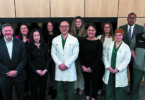As the population ages, so does the incidence of heart failure. The number of people diagnosed with heart failure will rise from about 5.7 million today to nearly eight million by 2030, according to the American Heart Association. However, the good news is that people with heart failure are living longer, healthier lives, thanks to improvements in treatment protocols, such as the multidisciplinary approach taken by UHS.
TRACKING YOUR SYMPTONS
If you have congestive heart failure, it is important to pay attention to any symptoms you may be experiencing. Tracking your symptoms is a good way to stay on top of them, and can help you decide when to alert your doctor or other provider. Symptoms to be aware of are:
- Shortness of breath
- Reduction in your ability to do your regular activities
- Elevated heart rate
- Weight gain or swelling, which can signal fluid retention
- Increased blood pressure
- Confusion or impaired thinking
- Loss of appetite
- Inability to sleep
The UHS Heart & Vascular Institute cares for patients with heart failure through its Congestive Heart Failure Clinic, a program staffed by physicians, nurse practitioners, pharmacists and a cardiac nurse navigator. The team works with each heart failure patient from the time he or she enters the hospital through the transition back home and beyond.
Enid Nixon, NP, and Kristen Lewis, FNP, introduce hospitalized heart failure patients to the clinic’s services. They meet with patients at the bedside to discuss medications, reasons for hospitalization, diet and other health issues. They also provide educational and support resources.
“When I see a patient and they’re sick, I try to figure out if there was any catalyst to it,” says Ms. Lewis. “Then I try to get them feeling better and help them transition to the home setting. We follow up within days of them going home, explain to them what their medications are for, tell them what to do if they gain weight, how to recognize symptoms and act upon them, and how people they’re living with can help.”
The cardiac nurse navigator also works with patients to identify necessary changes to diet and lifestyle, as well as address any additional needs. Since each patient is different, follow-up can continue as long as needed.
“Heart failure requires a lot of attention, so the key to management is intensive follow-up and education,” says Ms. Lewis. “Being involved in the care of our patients is so important.”
Ms. Lewis and Ms. Nixon aim to be their patients’ “point persons,” getting to know each of them individually, learning their histories, and providing quick access via telephone to answer any of their questions or offer support. Overall, this kind of personalization and continuity of care leads to better outcomes and reduced re-hospitalization.
“Since starting the heart failure clinic last year, I’ve developed close relationships with patients and families, working closely together to improve outcomes,” says Ms. Nixon. “I’ve seen them go back to their regular activities and spend more time with their families and less time in the hospital. Feedback from patients has been very positive, because they feel supported.”







